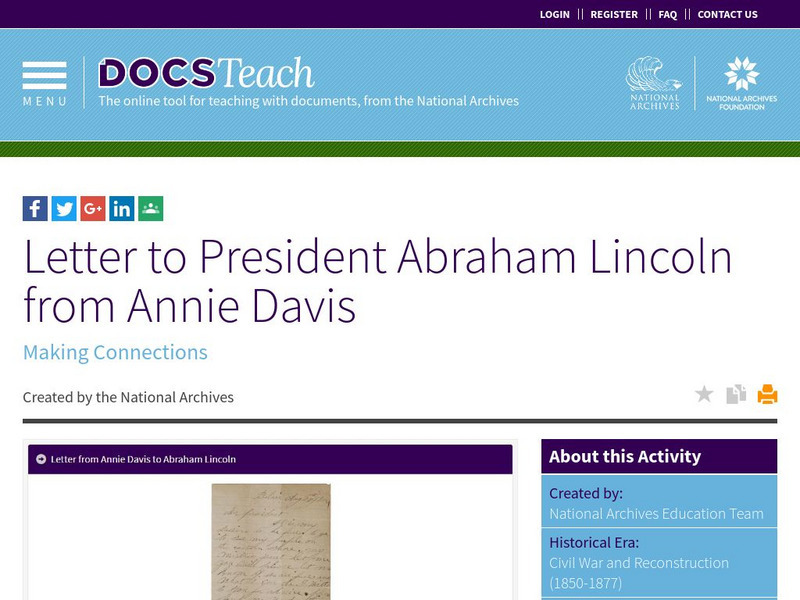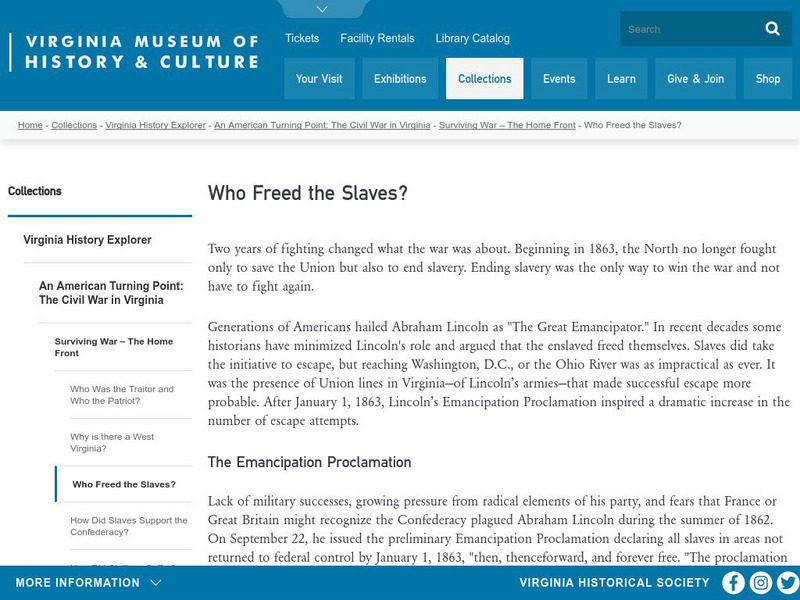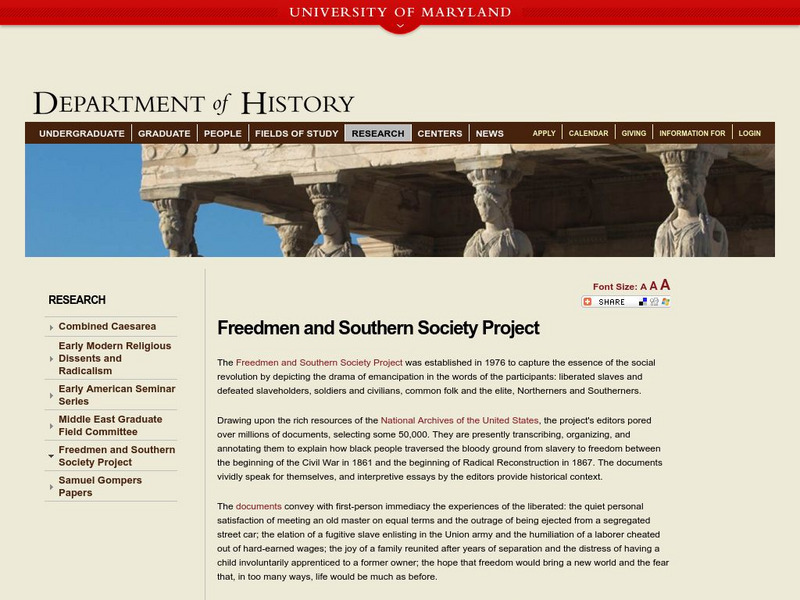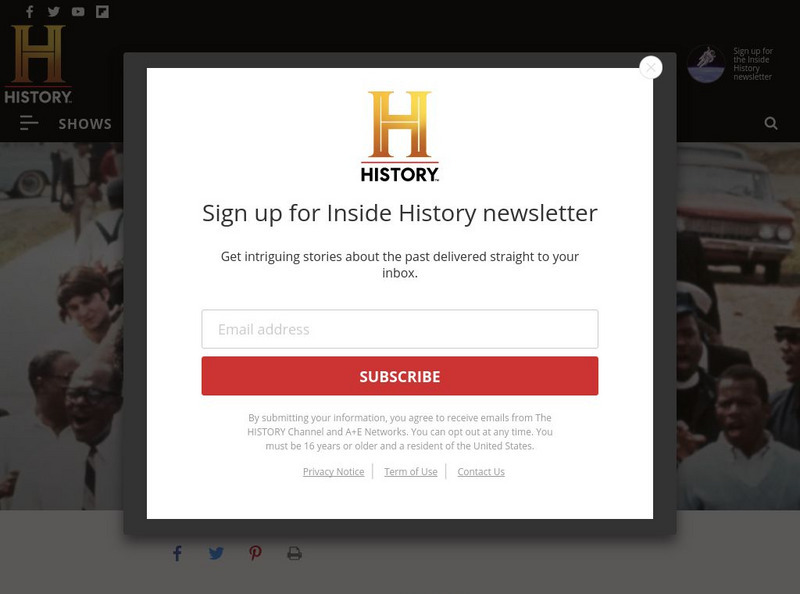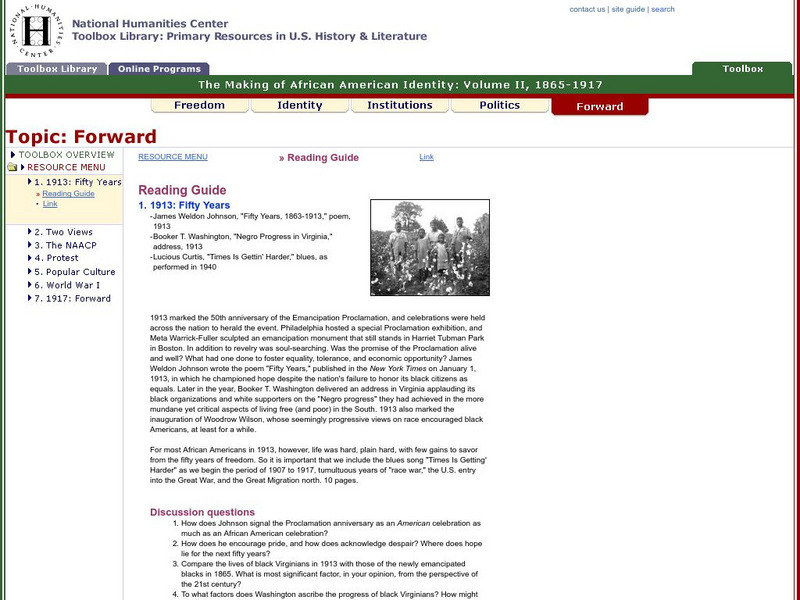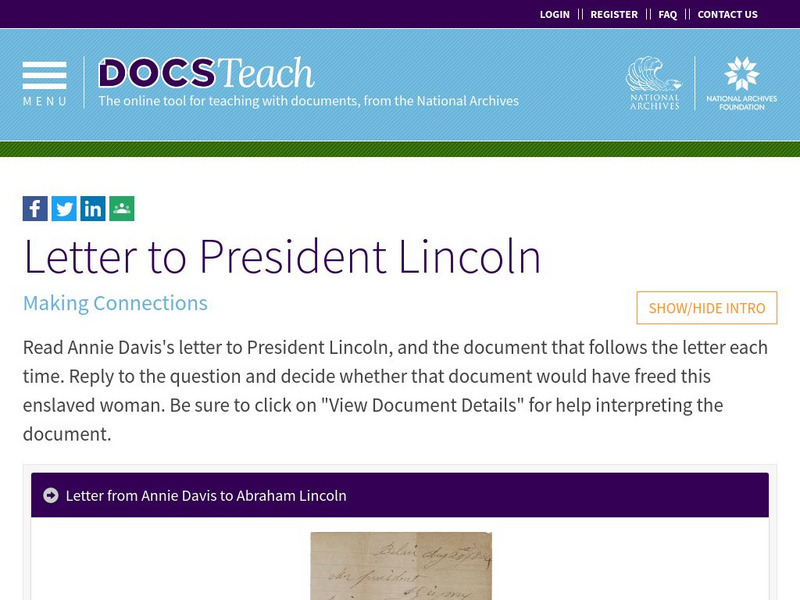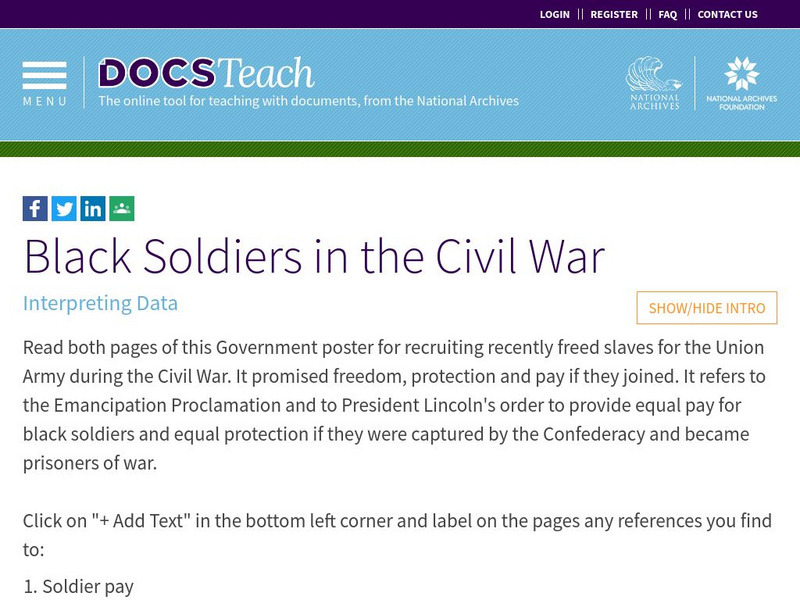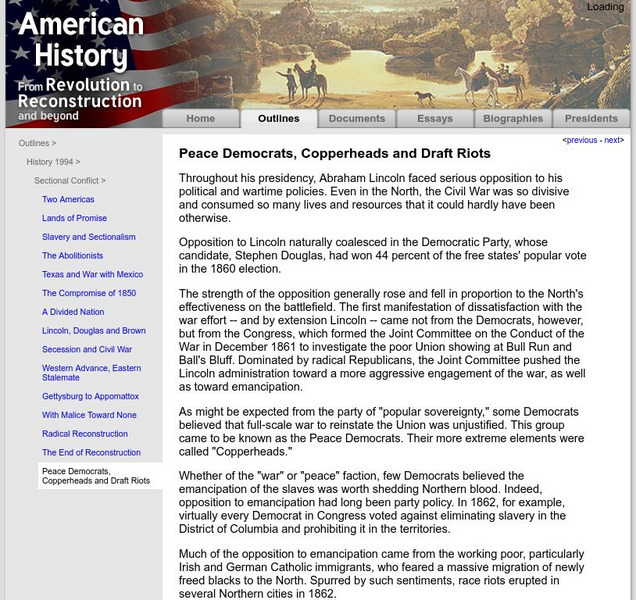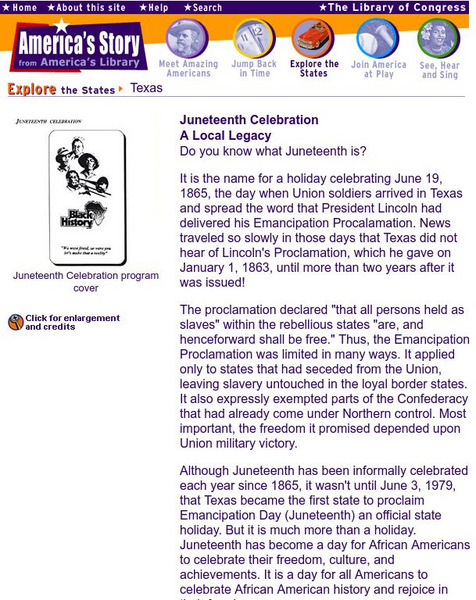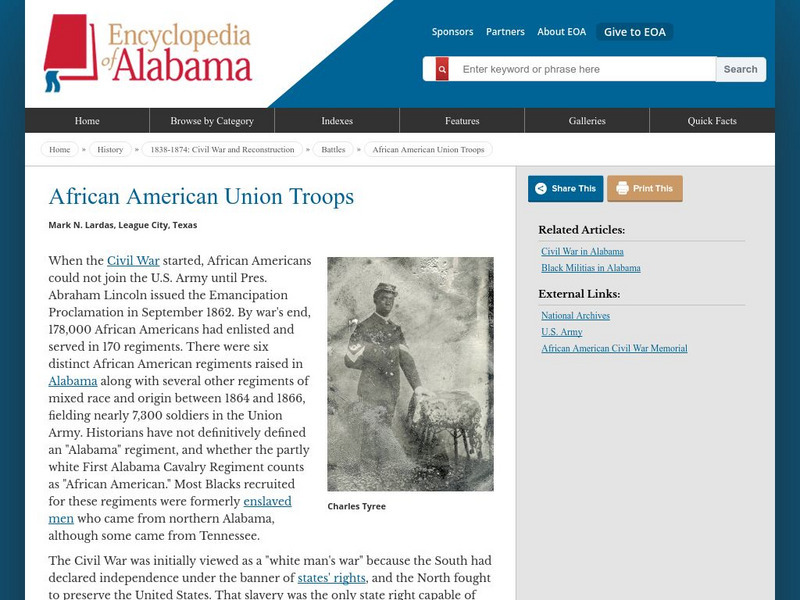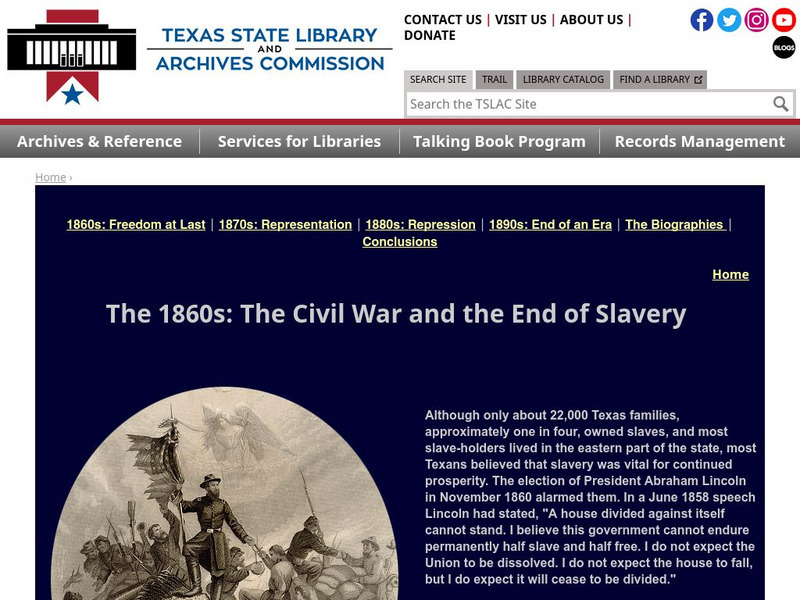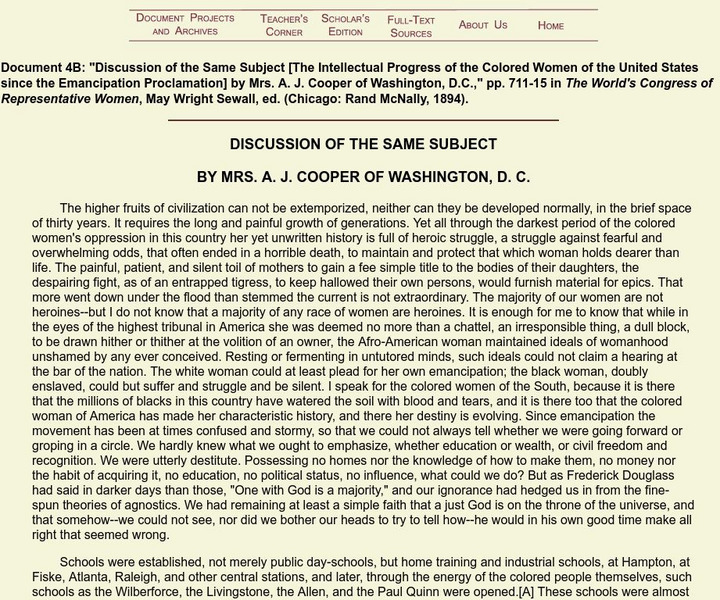Smithsonian Institution
National Portrait Gallery: The Mask of Lincoln: Proclamation of Emancipation
View an elaborate engraving of the Emancipation Proclamation, produced two years after Lincoln first issued it. It marries Civil War-era iconography with the text of Lincoln's declaration and is a useful resource for analyzing artistic...
National Humanities Center
National Humanities Center: Toolbox Library: Emancipation, 1864 1865
Letters and narratives of slaves freed at the end of the Civil War. An interesting look at the confusion and eagerness which confronted these newly freed Americans.
US National Archives
National Archives: Letter to President Abraham Lincoln From Annie Davis
"Will you please let me know if I am free?" wrote Annie Davis. Annie Davis was a slave who wrote this letter to President Lincoln 20 months after the Emancipation Proclamation. To understand her confusion, examine the following documents...
Virginia Historical Society
Virginia Historical Society: The Home Front: Who Freed the Slaves?
Describes how the Emancipation Proclamation of 1863 came into existence, the response from the South, and the impact it had. Three works of art from that period are presented, and the imagery and symbolism explained.
C3 Teachers
C3 Teachers: u.s. History Module: Did Lincoln Really Want to Free Slaves? [Pdf]
A comprehensive learning module on Abraham Lincoln that includes three supporting questions accompanied by formative tasks and primary source materials, followed by a summative performance task. Students examine the evolution of...
Library of Congress
Loc: Learning Page: The Freedmen
This resource provides information about the Freedmen, who were free after the Emancipation of Slaves.
University of Maryland
Department of History: Freedmen and Southern Society Project
Collection of primary documents that depict the social revolution and drama of the Emancipation in the words of the participants. Includes the voices of liberated slaves and defeated slaveholders, soldiers and civilians, common folk and...
A&E Television
History.com: Black History Milestones
A detailed account of the history of African Americans is presented in this article. Divided by main topics or periods of time, the coming of slavery to America is the first focus. Followed by plantation life and escapes to freedom and...
Curated OER
National Portrait Gallery: One Life: Proclamation of Emancipation
View an elaborate engraving of the Emancipation Proclamation, produced two years after Lincoln first issued it. It marries Civil War-era iconography with the text of Lincoln's declaration and is a useful resource for analyzing artistic...
Library of Congress
Loc: Abraham Lincoln Papers at the Loc
This American Memory site provides a comprehensive collection of Abraham Lincoln papers. Read the introduction page so you can see how they are organized. You can search by keyword or just browse the collection. Very interesting!!
National Humanities Center
National Humanities Center: Toolbox Library: 1913: Fifty Years, Making of African American Identity: V. 2
A poem, an address, and a blues song that express black life in the first fifty years after the Emancipation Proclamation. The texts examine whether the true meaning of the proclamation carried forward to the lives African Americans.
US National Archives
Docsteach: Letter to President Abraham Lincoln From Annie Davis
Students will study a letter from Annie Davis, a woman who was enslaved in Maryland and wrote a letter to President Abraham Lincoln during the Civil War to find out if 'we are free.' The students will decide if she received her freedom...
Alabama Learning Exchange
Alex: Yo! The Slaves Have Gotta Go!
In this lesson, students will explore the events leading up to the issuance of the Emancipation Proclamation. Students will work collaboratively to research and report their findings.
Other
The Works of Abraham Lincoln
This personal site gives links to the full text of several of Lincoln's famous speeches including the "Gettysburg Address," "The Emancipation Proclamation," and his inaugural addresses.
US National Archives
Docsteach: Black Soldiers in the Civil War
In this activity students will analyze a two-page poster that the Government used to recruit recently freed slaves to fight for the Union Army during the Civil War. The poster refers to the Emancipation Proclamation and to President...
University of Groningen
American History: Outlines: Peace Democrats, Copperheads, and Draft Riots
Abraham Lincoln did not have universal backing in the conduct of the Civil War. Read about the opposition, mainly from the Democrats, who opposed emancipation of the slaves and waging a war to reunited the country.
Library of Congress
Loc: America's Story: Juneteenth Celebration
This resource is a brief article about Juneteenth, or Emancipation Day, which celebrates the day when Union soldiers arrived in Texas and spread the word that slaves were free.
Library of Congress
Loc: African American Odyssey: The Civil War
Prints, photographs and documents form the Library of Congress collections tell a story of African Americans and the Civil War including contrabands of war, emancipation, soldiers and missionaries, and fighting for freedom.
Alabama Humanities Foundation
Encyclopedia of Alabama: African American Union Troops
Following the Emancipation Proclamation in 1862, African Americans were granted the right to join the U.S. Army, but this article takes a closer look at how this new right worked.
Other
Juneteenth.com: History of Juneteenth
Juneteenth.com discusses what Juneteenth is, its history, and its celebration. Content includes a look at why June 19, 1865, signifies the end of slavery in America, as opposed to Lincoln's Emancipation Proclamation of January 1, 1863.
Texas State Library and Archives Commission
Texas State Library and Archives Commission: The 1860s: The Civil War and the End of Slavery
What is the origin of the Texas holiday Juneteenth? Here is a brief article on how this day is connected to the Emancipation Proclamation and the freeing of slaves in the South.
Other
Women and Social Movements: "Intellectual Progress of Colored Women"
Transcript of Anna Julia Cooper's discussion of "The Intellectual Progress of Colored Women of the United States Since the Emancipation Proclamation," presented to The World's Congress of Representational Women in 1894. In it, she...




